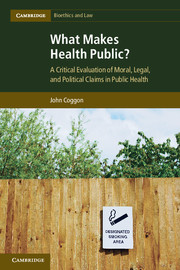 What Makes Health Public?
What Makes Health Public? Book contents
- Frontmatter
- Contents
- Foreword
- Acknowledgements
- What makes health public?
- Part I Basic concepts in public health
- Part II Evaluating evaluations: making health public
- 7 Analysis in the political realm
- 8 Making health public
- 9 Conclusion to Part II
- Part III Tackling responsibility: liberal citizens as subjects and sovereigns
- Bibliography
- Index
- References
8 - Making health public
from Part II - Evaluating evaluations: making health public
Published online by Cambridge University Press: 05 June 2012
- Frontmatter
- Contents
- Foreword
- Acknowledgements
- What makes health public?
- Part I Basic concepts in public health
- Part II Evaluating evaluations: making health public
- 7 Analysis in the political realm
- 8 Making health public
- 9 Conclusion to Part II
- Part III Tackling responsibility: liberal citizens as subjects and sovereigns
- Bibliography
- Index
- References
Summary
Introduction
Following the conceptual and analytic framing of the first half of this book, I seek now to explore the political framing of different arguments about how, why, and when health may be public. The particular works I discuss are familiar and influential, and can be mapped well onto the political spectrum from libertarianism to strong collectivism or contractarianism, described usefully as a heuristic device in the Nuffield Council on Bioethics’ report on public health ethics. The works I consider therefore provide a good representation of relevant arguments, and demonstrate how the work in the previous chapter relates to, and must come prior to, discussions in public health law and ethics. I will continue to argue that the meaningful normativity in the case of these arguments is political. As such, the common theme to normative analyses is the bindingly communitarian supposition entailed in politics of all brands. Equally, the most relevant analysis is that which is actually applicable to the world, and the most useful is that which is applicable given the practical normativity that can be achieved through liberal political structures (either existing, or ones that can realistically be established). None of this is about shirking moral responsibility or denying moral concern. Rather, it is about making two concessions in the face of real world concerns and idealistic abstracted responses to them. The first relates to moral epistemic uncertainty, and the (at least practical) truth of moral pluralism. Even if there were a single true moral system – encapsulated, for example, in a comprehensive theory of justice – we still in practice find what is best described as ‘reasonable disagreement’ about what it obtains in. And beyond differences of interpretation of single evaluative frames (such as justice), there are a great many “rationally incomparable” value systems: I take it that these can functionally coexist and direct people’s lives, provided there is an alternative source of normativity to morality (i.e. political normativity). And this leads to the second concession. If we are to live harmoniously we must sometimes sacrifice at least some ideal or valued positions. Political normativity does not demand that a ‘right’ answer be given to every practical problem, less still mechanisms to ensure that the ‘right’ decision be effectuated by everyone in every instance. But harmony can demand that “radical choices” be made between values, to the exclusion – and practical denial – of other values. This must be done to give substantial content to, and allow protection of, the common good, however that is understood: it is necessary, for example, in order to give content to a ‘harm principle’, to assure a sufficiency of welfare amongst members of a population, or give content to and ensure that human rights are respected. Some theories will prioritise liberty, or their advocates emphasise the value of liberty. But to reinforce my own emphasis, in a political theory the common good is the real default against which normative claims are to be tested. A presumption in favour of liberty is really just a presumption only to regulate where and as the common good demands; an edict against random, unnecessary, or unjustifiable policy-making. Thus we need to establish what the public good demands, and in this chapter I discuss various ways this question has been addressed, focusing on works which are in – or at least brought into – public health law and ethics.
- Type
- Chapter
- Information
- What Makes Health Public?A Critical Evaluation of Moral, Legal, and Political Claims in Public Health, pp. 149 - 201Publisher: Cambridge University PressPrint publication year: 2012
